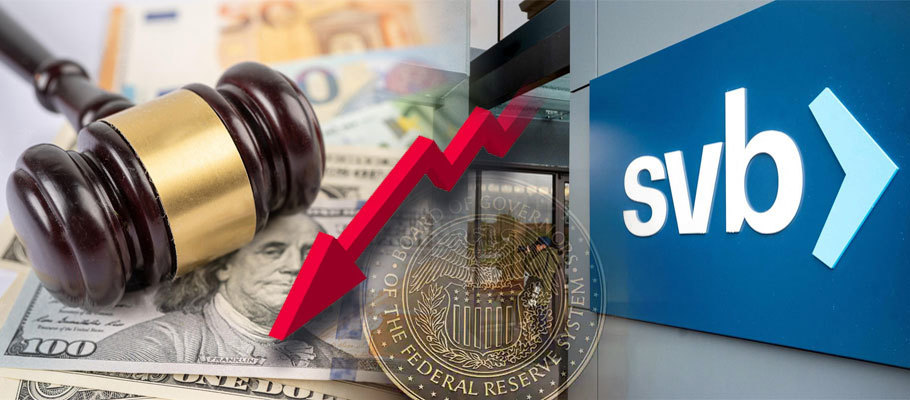
Published: March 15th, 2023
Short-term bond yields are cratering around the world as forex traders make bets on central bank interest rate policy in the aftermath of Silicon Valley Bank's (SVB) collapse. The assumption appears to be that The Fed will have little choice but to downscale intentions for future rate hikes.
In forex markets the Greenback fell sharply when US bond yields suffered a steep decline that happened faster than in other markets. GBP and EUR were early beneficiaries. Both fiats pushed higher on Monday 13th March as the week’s session got underway.
SVB’s collapse has sent shockwaves through the global banking system. After losses on its bond-heavy investment portfolio it went on the hunt for fresh funding. American and British regulators sprang into action to protect SVB depositors, with Westminster shepherding the sale of SVB's UK assets to HSBC.
Ahead of the bank’s fall into distress, the yield on two-year American government bonds rocketed to levels last seen in 2007. The sudden rise happened on trader expectations that the Fed will raise interest rates by 50 basis points next week. Bond yields then fell so quickly that markets now see a rate hike of 25 basis-points as more likely. The Dollar has been hammered as a result.
The GBP/USD exchange rate rose by one percent to 1.2149 on Monday, extending a rebound that began the previous Friday. The EUR/USD exchange rose 0.80% to reach 1.0735.
The Greenback’s losses have only been exacerbated by news that US lender Signature Bank has also collapsed after a sudden run, hardening investor perceptions that the pace of interest rate hikes by the Federal Reserve are altering how well the American financial system functions.
‘The failure of these banks can be traced back to rapidly rising interest rates and resulting yields, both directly driven by Fed monetary policy,’ said a report from Barclays FX and Commodity Research unit.
The damage so far has been limited to lenders with outsized exposure to the tech and crypto sectors, but traders are now betting that the Fed will try and avoid further spreading of systemic stress.
The dollar extended declines in Asia on Tuesday, 14th March as traders assessed the impact of the SVB and Signature Bank collapses. Barclays said investors are now looking at the subsequent announcements by the Federal Reserve and Federal
Depositors Insurance Corporation (FDIC) that other US banks and will have access to a new lending facility to stop contagion from spreading.
'Markets are witnessing this week the biggest three-day collapse in two-year US bond yields since 1987’s ‘Black Monday,’ Barclays added.
In March 2022 a rallying greenback hammered most G10 majors including the Euro and Yen. Barclay’s FX strategy unit wrote at the time that the dollar’s core drivers were ‘easy enough to see’.
‘You have a hawkish Fed mixed with a waning global risk appetite. Meanwhile the Eurozone is grappling with a situation that look like stagflation, while Chinese economic lockdowns sparked by the latest Covid outbreak look set to drag growth expectations down.’
Barclays said GBP/USD rate losses seen at the time were a reflection of the widening policy gap between the Fed and Bank of England (BoE). Monetary policy, its impact on American government bond yields and the relative advantage these bestowed the greenback were all on focus as the Federal Reserve readied markets for new policy decisions.
The Fed was widely expected to raise its interest rate by 50 basis points, as Chairman Jerome Powell essentially said previously that this would be considered at the April 2022 meeting.
But the US central bank was also expected to announce plans for QT or quantitative tightening, the balance sheet reduction process that will scale back the stimulus being pumped into the US economy since the first COVID outbreak. This is where market expectations may see an upset.
'When we decide on timings, we're mindful of the wider financial and economic context,’ Powell said at the Fed's monthly press conference in April 2022. 'We will use the tools at our disposal to support financial and economic stability.
‘We always want to support growth while sustaining financial stability. We also want to avoid bringing more uncertainty to an already uncertain situation.’
The dollar’s gains and losses for other currencies combined to create an inflationary mess that risked pushing other G10 central banks to raise their respective interest rates earlier than they might have otherwise.
An analyst note from the FX strategy unit at BMO Capital Markets said at the time that remarks from both the BoE and ECB confirmed that a weak Euro had become a worry for Frankfurt.
A strong greenback and rising US bond yields also prompted the People’s Bank of China (PBoC) to hold back on stimulus for regions where COVID containment measures had led to economic slowdown, stoking market fears about the global economic outlook.
Claude Poiron, head of Emerging Markets FX strategy at Westpac, told Bloomberg that rising US interest rates were driving capital outflows. ‘Because they aren’t synchronized with Beijing's divergent monetary policy, that adds downside to growth risks.’
It’s also true that the Greenback’s advances last Spring exacerbated losses for the Yen, causing consternation from Japan's Ministry of Finance.
‘The Bank of Japan continues to maintain that the benefits of a weaker Yen outweigh the downsides, but officials have said they will respond appropriately if conditions change,’ added Poiron.
Al of this occurred after a month where ‘hawkishness’ among the Fed’s Federal Open Market Committee (FOMC) policy group officials became the norm. The approach made gains for the Dollar and pushed back other currencies, majors and emerging market currencies alike.
Barclays noted that the Pound had taken a beating in March 2022 as risk appetite softened. The momentum on rate rises had also moved across the Atlantic from London to Washington, they said.
– Mark de Wolf for FX-List